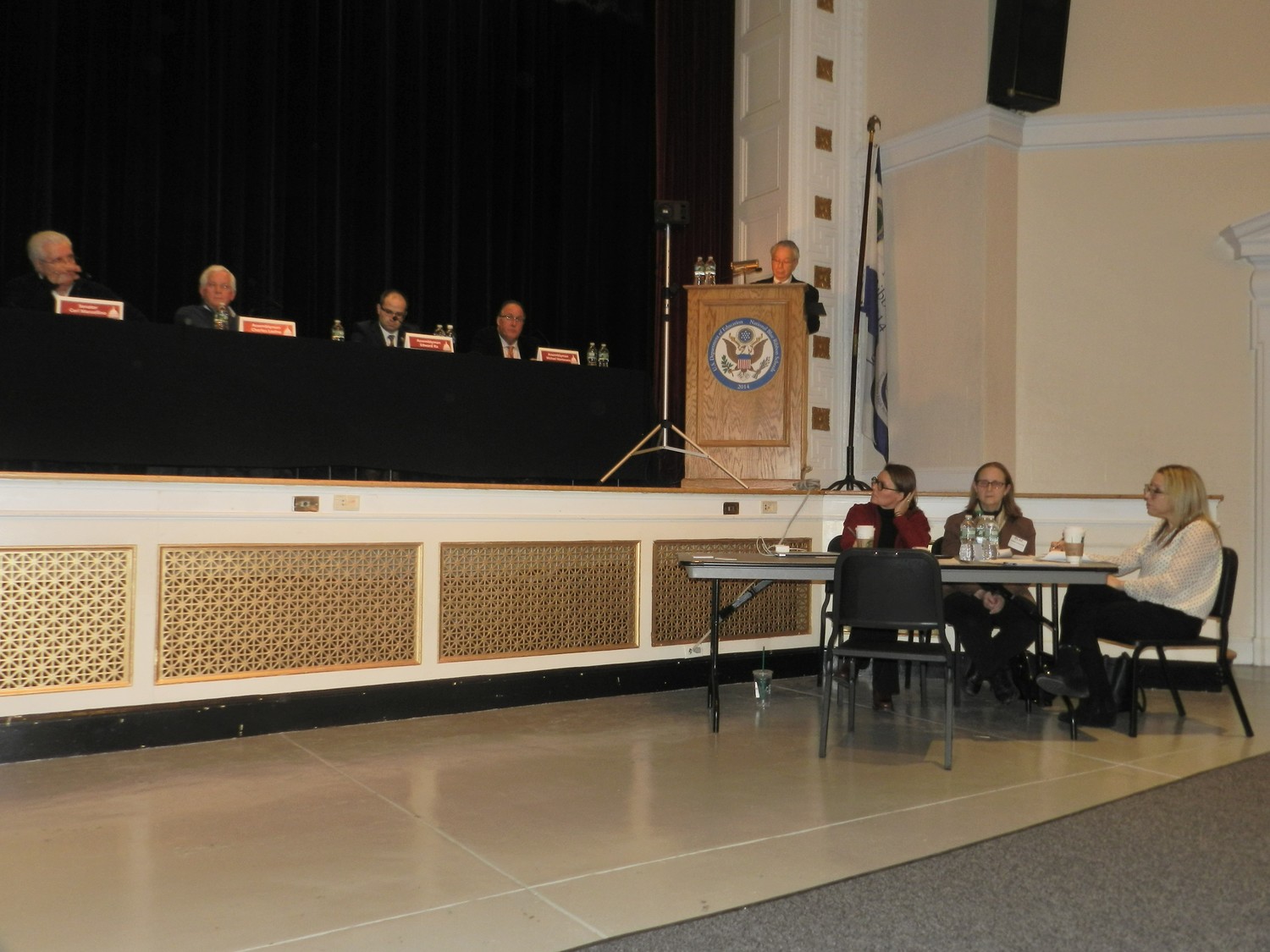North Shore schools get political
Lawmakers discuss key issues affecting district
A panel of politicians lined the stage at Glenwood Landing School’s theatre last Thursday to participate in the Legislative Action Committee’s second Legislative Night.
The panel featured Senator Carl Marcellino, Assemblymen Michael Montesano, Edward Ra, and Charles Lavine, and Legislators Delia DeRiggi-Whitton and Josh Lafazan.
The lawmakers discussed an array of issues affecting the district, such as grade and teacher evaluations, local control, opt-out rates, the tax cap, PILOTS, and New York American Water. Questions were submitted in advance by residents of the district, and were moderated by Trustee Herman Berliner.
Legislative Night offered the community an opportunity to get a sense of legislative work sessions at the state and local levels. As questions were presented, the panel discussed what they could and couldn’t do, in so far as changing legislation to amend an issue. However, there was no facility for public comment during the evening.
“These forums are helpful to garner the information we need to take back to Albany, and deliver the best for our school district,” Montesano said.
The panel addressed the following questions:
• Common Core and APPR standards: Ra said that legislation to repeal NYS Education law statutes 3012-C and D is being revisited. Both laws are intended to foster teacher development and create more rigorous, fair, and accurate assessments of teacher effectiveness, according to the NYS Department of Education.
• Opt-out rates: Lawmakers said they support families who opt-out, and denounce micromanagement from the state and federal government in that regard.
• English Language Learners services: Can lawmakers find funding for the mandate because there is no state funding to pay for ELL services. Lavine said this measure must be included in respective budgets since some districts are more in need of ELL services because of diverse populations.
• LIPA plant decommissioning and New York American Water: What is the legality of distributing the district’s state-funded glide path grant monies to homeowners affected by rates imposed by NYAW. Both Marcellino and Lavine said this was not a possibility, but that legislation was in the works to have an independent auditor regulate the finances of the Public Service Commission. Additionally, Montesano said that legislation is being revisited to amend statute 585-D of NYS Property Tax law, which exempts property taxes on private corporations in NYC, but not in Nassau County.
• The tax cap: Are modifications being made to the tax cap to avoid a negative cap and balance tax breaks? Ra said modifications would be scarce due to the current climate, and would be made even more difficult with the new federal tax plan.
• PILOTS: Lavine said that if PILOTS are executed properly, they add value to the district. Marcellino said that companies should be held to a higher standard in the deals they make with the district.
• The opioid epidemic: The question suggested that North Shore Coalition Against Substance Abuse should be provided critical information from the county to measure its efforts in fighting the “opioid scourge.” Lawmakers agreed that the data should be made available to NSCASA, and that education and prevention is key.
• The federal tax plan: What are the consequences of the federal tax law on state budgets? Ra and Lavine acknowledged N.Y. as a complex, industrial, high-tax state, and that the plan would drain other major states like N.Y. of their subsidies, eventually bankrupting those states, which are the economic drivers of the nation.
• Large-scale development projects: Corporate developments such as RXR are “congesting communities.” What can be done to minimize the impact of these entities. Montesano said it was up to the residents to become more vocal in combating corporate development at the local level.
When explaining the purpose of the evening, LAC chairperson Deborah McDermott, of Sea Cliff, said,
“To have decision-makers knowing your concerns, knowing that you’re paying attention, and advocating for you at state budget time is really critical to getting what we want.”
Some residents, however, were unsatisfied with the format in which the questions were asked. They believed that the requirement that questions to be received in advance led to a lack of engagement from the audience.
Steve Warshaw, vice president of the Glen Head/Glenwood Business Association, emailed McDermott before Legislative Night, and encouraged her to reconsider the discussion format.
“I know the legislators are always prepared to meet face-to-face with the public, and the results of that kind of discussion [are] much better received by both the business and residential community,” Warshaw said.
He called the format of the evening “lousy.” “They could’ve had someone walking around with a microphone taking questions — people in the audience were frustrated because none of our questions were answered,” he said.
McDermott defended the format. “We really wanted to go deep and get clear on a couple issues,” she explained. “It’s important to be able to direct a line of questioning that keeps things very orderly, and keep the panel from getting pinged around.”
It’s important, she added to involve LAC and the community in legislative affairs. “The community activism here to date has helped to bring the New York American Water issue [to light]; things are going to change here because of it,” she said. “We need to continue that pressure, and continue that focus, but if we just complained to each other on Facebook about this, we wouldn’t be having any meaningful results.”
LAC’s objectives moving forward is to continue to advocate for state funding at the state level, and changes in regard to improving educational policy and testing, reengaging the Super Legislative Action Committee with the Garden City and Manhasset school districts, and digging deeper into the effects of the federal tax act on school funding and taxpayers on Long Island.

 49.0°,
Fair
49.0°,
Fair 





